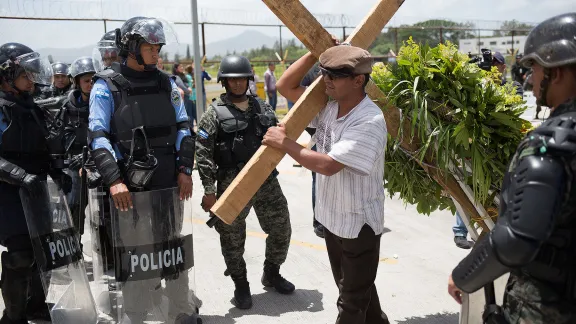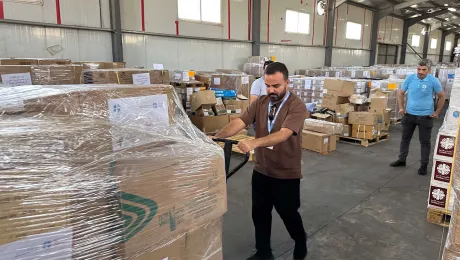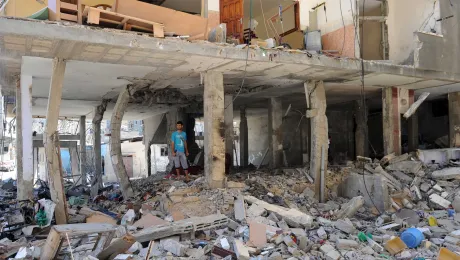
As part of the events to mark the tenth anniversary of the coup, Lutherans held a public prayer service at the spot where the first fatal victim of the coup was killed. Riot police and army surrounded the event as a memorial cross was carried to the center of the capital city afterwards. All photos: LWF/S.Hawkey
Ten years of searching for justice, peace and equality
(LWI) - Ten years on from the military coup against President Mel Zelaya in Honduras, the Lutheran church in the Central American nation continues to raise its voice for justice and peace in the country, while providing practical support to migrants and returning refugees.
The June 2009 coup brought unprecedented political turmoil, leaving in its wake a legacy of some of the highest levels of violence and poverty in the world. Unresolved accusations of electoral fraud and corruption by the current government have brought masses of people onto the streets in ongoing strikes and protests since November 2017.
Currently protests include national strikes by the main trade unions of teachers and doctors, as well as university and school students, transport workers and even sections of the police. Violence, including assassinations, imprisonment and repression create a complex and dangerous environment in which the Christian Lutheran Church of Honduras (ICLH) remains a prophetic presence. The Lutheran World Federation (LWF) member church is in solidarity with the most marginalized, offering alternatives to the widespread phenomenon of migration.


Army and Police are deployed massively across the country to control protests using force. Here riot police block the main door to the Cathedral in Tegucigalpa.

Rev. Rolando Ortez Martinez, President of the Christian Lutheran Church of Honduras (pictured with clerical collar) spoke recently in a public demonstration to mark the tenth anniversary of the coup.
Rev. Rolando Ortez Martinez, President of the Christian Lutheran Church of Honduras (pictured with clerical collar) spoke recently in a public demonstration to mark the tenth anniversary of the coup: “We are here in what we have named the Isy Obed Murillo Square. This is where in 2009 the first person fell to the dictatorship, just here is where the shots came and where he fell [… ] It is ten years since the coup, and ten years of searching for justice, peace, and equality in our country. We have just tried to have a liturgy here, to remember the martyrs of this struggle, but the military have taken our sound system, they have stopped people arriving. Despite this, we’ve been able to celebrate with some prayers, and we’ve read some biblical texts, to remember Isy Obed Murillo, the first fatal victim of the coup, the first of many, and sadly the killing goes on.”
He continued: “The Lutheran church calls on people across the world to pray for this country and its people, that one day justice may reign here. The Honduran people need peace and justice, education and healthcare for everyone. We pray for solidarity to help us overcome the injustice, we want people across the world to speak out in solidarity with the Honduran people, and that will give us strength to continue struggling for justice.”

Honduran migrants on a migrant caravan across Mexico to the United States: many thousands have left the country in recent months.
Violence, poverty and migration
In recent months tens of thousands of Hondurans have left the country in despair heading to the United States, some seeking asylum as refugees from the generalized violence, and many as economic migrants looking for alternatives to grinding poverty. The International Organization for Migration says that there is a correlation between poverty, violence and migration in the region, with many thousands searching for safer conditions for their families.
While many still ‘make it’ to the US, many families are separated at the Mexico/US border, and the journey is hazardous. Some die on the way and many experience abuse and discrimination on the journey, as well as in the US. In the other direction there is a continuous flow of people deported by authorities from the US and Mexico, as well as voluntarily returned migrants.
With support from the Evangelical Lutheran Church in America (ELCA), the LWF runs a program to accompany returned and deported migrants, helping them to improve their living conditions so they don’t feel the need to return. Working alongside other ecumenical partners, the churches seek to implement a strategy known as AMMPARO, which addresses the root causes of migration, while serving to guarantee the safety and rights of all children and families in transit.

Deported migrant Carlos Andrés Enriquez Hernández, 23, has learned tailoring through an LWF program in Olancho, Honduras.
The program has attended to hundreds of returnees. Carlos Andrés Enriquez Hernández is one of them and he explained why he left the country: “I left my place because of danger. What does danger mean? Ha! Danger here is not an abstract concept. My whole family was threatened by a gang. Threats against your life are part of controlling you, subjecting you. My whole family had to leave. People who don’t take notice of threats like that are simply killed. We’ve lost a lot of friends and neighbors, they disappeared. The gang here use a tourniquet on your neck, that’s their signature.”
Caught by a border patrol shortly after crossing into the US, Enriquez Hernández was kept in ‘iceboxes’ until he was deported: “I was in four iceboxes in the US, about three days in each. The icebox is a room where they put you with very cold air conditioning, the aim of it is to freeze you, to make you more likely to sign the form so that they can send you straight home. It really is freezing, you are on the floor, there’s no bedding, you don’t have enough clothes, your teeth chatter and you feel like you are going to die. I was deported after about 20 days and I met someone here in Juticalpa who told me about the LWF program.”
“When I came back, I had to move, and I had nothing, I lost everything. The LWF helped me get to safety and get back on my feet.”
The Lutheran church and Lutheran organizations that provide support and sustenance on the ground in Honduras give daily witness to their faith in solidarity with the poor and dispossessed and call on Lutherans worldwide for their prayers and support.
Written for LWI by correspondent Sean Hawkey


